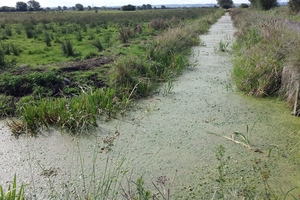Action needed to fix Somerset Levels and Moors' phosphate level
Natural England has downgraded the environmental condition of the Somerset Levels and Moors Sites of Special Scientific Interest (SSSIs) due to water quality issues.

Phosphates are causing algal blooms in the Somerset Levels, like Tealham SSSI
This decision to change the condition to ‘unfavourable declining’ follows water quality monitoring that revealed that phosphate levels are three times higher than they should be, causing biological harm and producing algae and duckweed that is harmful to wildlife.
The primary sources of phosphates are from agricultural activities and water industry discharges at locations like waste water treatment works. Significant investment has already been committed by the water industry and plans are being developed to prevent further inputs from new development.
Natural England will now work with those who can reduce the level of phosphate, including Wessex Water, the Environment Agency, landowners and farmers and wider stakeholders, to put solutions in place that will aid nature’s recovery and improve the natural environment for local people and visitors to enjoy. This will include:
- further investment by Wessex Water up to £57m to reduce discharge from water treatment works by 2024
- regulatory enforcement and advisory visits to improve agricultural compliance and provide advice to farmers and landowners
- new and innovative solutions which will allow landowners to be appropriately rewarded for the ecosystem services they provide.
Natural England works with SSSI owners to advise on how to protect and improve the condition of SSSIs and has changed the condition to reflect what is now understood about the impact of water pollution on these sites, and to drive positive action by all sectors to recover nature in this unique landscape.
Natural England Area Manager for Wessex, Matt Heard, said:
The Somerset Levels are much loved and internationally important for wildlife, home to tens of thousands of birds, rare plants and insect life.
There is widespread evidence that nutrient pollution is causing biological harm in the waterways of the Levels. As a result of this, Natural England must change the status of SSSIs on the Somerset Levels to unfavourable declining.
Water pollution needs to be addressed across the Levels. Natural England is working with partners to deliver action that will restore water quality, aid nature’s recovery and improve the natural environment for local people and visitors to enjoy.
Environment Manager for Environment Agency Wessex, Jim Flory, said:
This report provides us with invaluable evidence about the threats facing this critical area, together with the remedies we collectively need to focus on to address the issues.
We will continue to focus our available resource on working with our partner agencies and local authorities to drive improvements to protect this internationally important site. We have already started this work by working with Wessex Water to drive improvements through their capital investment programmes, and we anticipate that they will spend in the region of £57m across Somerset in the next few years.
There are many joint projects underway to enhance the uptake of voluntary measures, localised river and habitat improvements and to enable continued development in the county which does not exacerbate the decline in water and habitat quality. One of the key actions is for us to undertake regular enforcement and advisory visits to improve agricultural compliance and provide advice to farmers and landowners.
Nutrient pollution needs to be addressed urgently, or it will continue to negatively affect the ditch communities and associated wildlife. And without which, the situation is likely to deteriorate further as nutrient enrichment interacts with the effects of climate change.